There are a range of independent rural broadband providers operating across different parts of the UK, helping to bring full fibre and gigabit-capable broadband to rural homes.
For rural communities willing to work together there is also the option to apply for vouchers from the Government, which are designed to help underserved areas get online.
For very remote areas however, they may need to look at alternative broadband connections like fixed wireless, mobile broadband, or even satellite broadband.

At a glance: rural broadband deals
Rural broadband providers often focus on connecting specific areas around the country, with different providers working in different locations. As a result, prices and availability will vary from region to region.
Here are some entry-level deals offered by rural broadband providers:
| Package | Broadband | Monthly price | Upfront price | Contract term | |
|---|---|---|---|---|---|
 |
Full Fibre 100 | 106Mb average | £29.99 | Free | 24 months |
 |
Superfast 200 | 200Mb average | £17 | Free | 18 months |
 |
Full Fibre 100 | 150Mb average | £29.99 | Free | 24 months |
 |
Full Fibre 175 | 175Mb average | £24.99 | £24.99 | 24 months |
Rural broadband providers
As mentioned, it's likely each rural area will be served by a different broadband provider, so knowing which provider is connecting your area is the first step.
Here's a run-down of some of the bigger rural broadband providers in the UK and the areas they're working in.
Openreach
Openreach operates the largest full fibre broadband network in the UK, and has plans to extend coverage to a total of 25 million homes and businesses by the end of 2026.
With the support of public funding in England, Wales and Scotland, Openreach also plan to upgrade around six million premises in the most remote areas of the country, with a targeted build rate of 75,000 premises a week.
Many rural homes may already have Openreach FTTP, with connections laid in areas as remote as the Outer Hebrides and the Isle of Scilly, among many rural towns and villages throughout the UK.
The biggest benefit to Openreach FTTP rollout however is that many providers resell access, which helps drive down costs to customers and increases choice.
Here is just a selection of broadband deals available where Openreach FTTP has rolled out:
| Package | Broadband | Monthly price | Upfront price | Contract term | |
|---|---|---|---|---|---|

|
Full Fibre 100 | 109Mb average | £26.99 | Free | 18 months |

|
Ultrafast Broadband | 145Mb average | £29 | £5 | 24 months |

|
Full Fibre 145 | 145Mb average | £28.99 | Free | 24 months |

|
Full Fibre 100 | 150Mb average | £29.99 | Free | 24 months |
Use our broadband checker to see what's available in your area.
Fibrus
Fibrus are an independent full fibre network provider who specialise in reaching rural and underserved areas, particularly in their home country of Northern Ireland.
While coverage in Northern Ireland has now reached 40% of premises, Fibrus are continuing to roll out their services, with a total build target of 350,000 homes and businesses.
In addition, they've also started work on connecting properties in rural Cumbria, with a planned coverage of 60,000 premises in the county. Eventually, Fibrus also plans to connect residents to full fibre broadband in Northumberland and Durham, as well as throughout Scotland.
Here is a map of their main coverage in Northern Ireland:
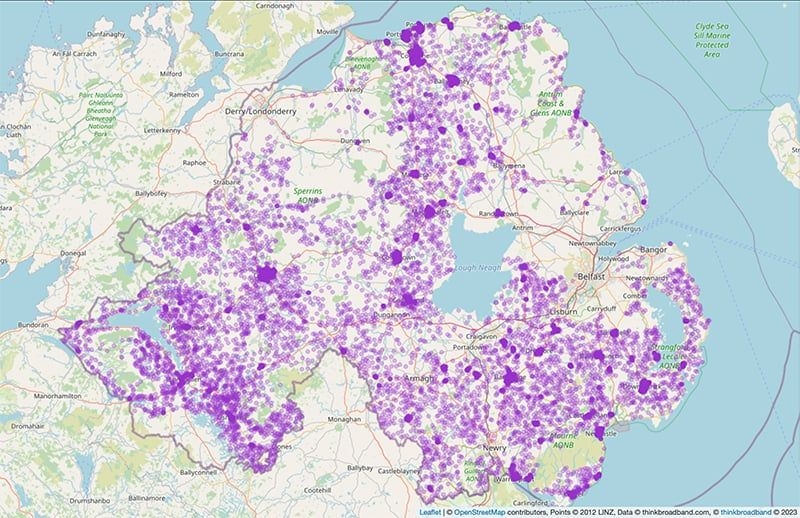
Prices for Fibrus broadband are competitive, with pricing generally lower than resellers of Openreach FTTP.
Here are the main Fibrus broadband deals for rural areas:
| Package | Broadband | Monthly price | Upfront price | Contract term | |
|---|---|---|---|---|---|

|
Full Fibre 100 | 106Mb average | £29.99 | Free | 24 months |

|
Full Fibre 500 | 518Mb average | £34.99 | Free | 24 months |

|
Full Fibre 1000 | 982Mb average | £59.99 | Free | 24 months |
Residents living in more urban areas of Northern Ireland may be able to access even cheaper pricing on their Full Fibre 150 plan, which Fibrus say is due to the lower costs of connecting them.
Read more in our full review of Fibrus broadband.
Gigaclear
Gigaclear are one of the UK's largest rural specific broadband providers, with a focus on rural areas in the South and the Midlands.
So far, they've passed over 500,000 rural homes and businesses across 25 counties, including:
- Gloucestershire
- Herefordshire
- Oxfordshire
- Northamptonshire
- Wiltshire
- Berkshire
- Devon
- Somerset
- Essex
- Kent
The map below shows Gigaclear's current coverage in the UK:
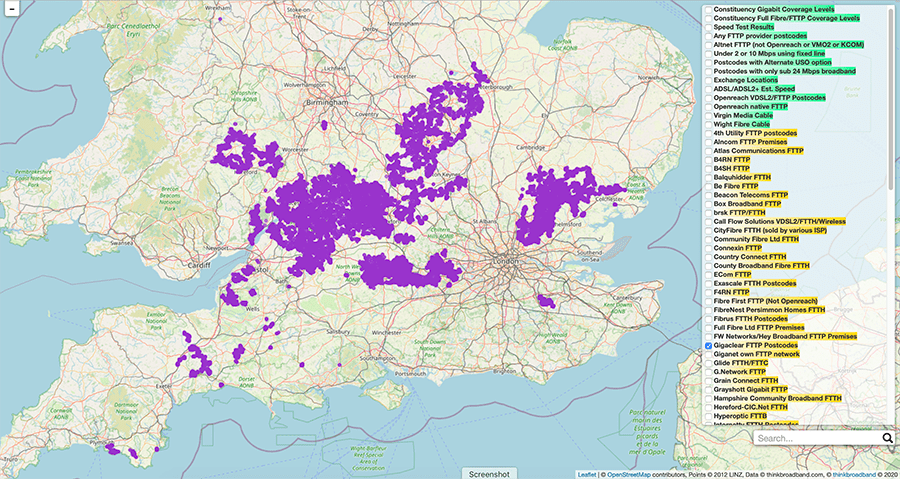
Gigaclear have dense coverage particularly in Gloucestershire, west Oxfordshire, Essex and Berkshire, and are beginning to rollout into parts of Somerset, Devon, and Kent with some availability in rural areas on the outskirts of Sevenoaks.
In June 2023, Gigaclear secured private investment of £420 million and laid plans to achieve a coverage target of one million premises passed by 2027.
The provider expects to have 500,000 premises ready for service by early 2024, and started work in Yorkshire for the first time at the end of June 2023. The first villages to be connected are Brayton, Cawood, Thorpe Willoughby, and Hillam.
In 2022, Gigaclear added 50,000 premises to its network, including the villages of Buntingford in North East Hertfordshire, Lympsham, Eastertown, Edingworth and Rooks Bridge in Devon and Somerset, and additional properties in Braintree in Essex where they've connected over 6,500 homes and businesses.
The latest pricing for Gigaclear broadband's most popular packages is:
| Package | Broadband | Monthly price | Upfront price | Contract term | |
|---|---|---|---|---|---|

|
Superfast 200 | 200Mb average | £17 | Free | 18 months |

|
Ultrafast 500 | 500Mb average | £25 | Free | 18 months |

|
Hyperfast 900 | 830Mb average | £29 | Free | 18 months |
Gigaclear is the UK's largest rural broadband provider as they've targeted their business to connect underserved rural communities across the UK, using both private funding and BDUK funding from the Government.
Their broadband network offers fibre to the home connections with average download speeds of up to 830Mbps for both homes and businesses.
Overall, for anyone who they've passed, they're a well-regarded rural broadband provider with awards from the Internet Service Providers' Association (ISPA) in 2020, 2018, and 2017. They also won the Best Rural Provider award in the Choose Broadband Awards 2022.
Read our full review of Gigaclear.
Airband
Airband are a rural broadband provider that offers both fixed-line full fibre to the home connections and fixed wireless broadband for more remote properties where full fibre isn't an option.
So far, Airband have coverage in rural areas of the following counties:
- Devon
- Oxfordshire
- Wales
- Shropshire
- Worcestershire
- Gloucestershire
- Cheshire
However, the majority of their coverage is in Devon and Shropshire as the below coverage map indicates:
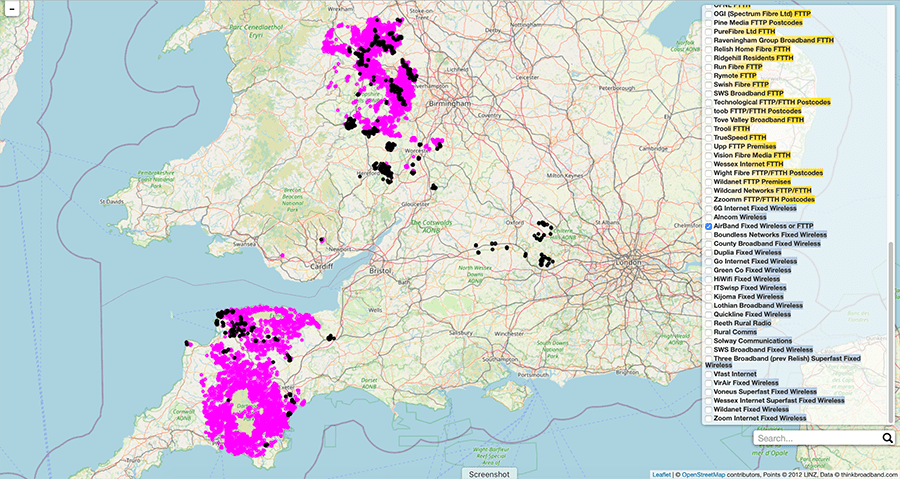
Airband broadband connections cost from £25 per month for a 40Mbps full fibre connection, or £30 for a 40Mbps fixed wireless connection.
| Package | Broadband | Monthly price | Upfront price | Contract term | |
|---|---|---|---|---|---|
 |
Fibre 40 | 40Mb average | £20 for 10 mths, then £25 |
Free | 24 months |
 |
Fibre 300 | 300Mb average | £25 for 10 mths, then £35 |
Free | 24 months |
 |
Fibre 900 | 900Mb average | £35 for 20 mths, then £55 |
Free | 24 months |
Airband also offer customers free surveys and installation, along with bundling a WiFi 6 enabled Linksys router, or any equipment that's needed to receive the wireless signal for more remote homes.
The provider says they won't hike prices during a minimum term, which is unlike most major providers who are now increasing their prices each year above inflation.
If you're living in one of the counties covered by Airband but it's not available to you yet, it's worth getting in touch with them as they actively ask for interested communities to get in touch.
B4RN - Broadband for the Rural North
Conversely to Gigaclear, B4RN, or Broadband for the Rural North, focus their network efforts in the North of England, specifically in Lancashire and Cumbria.
B4RN has so far passed over 20,000 properties across the UK, in areas including:
- Lancashire
- Cumbria
- Cheshire
- Norfolk
They're also actively continuing to build with projects in the Allen Valleys, Cheshire and East Anglia.
The map below shows areas where B4RN have rolled out, with their largest area of rural coverage extending from Longridge and Lancaster in Lancashire, to Kendal in Cumbria.
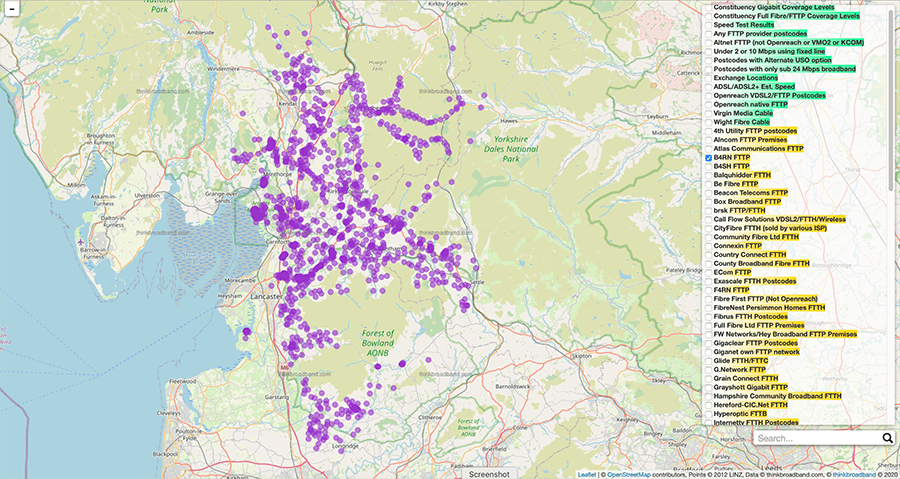
They also have network coverage just outside the village of Diss in Norfolk, the villages of Shotwick and Capenhurst in Cheshire, as well as Kirkoswald, Catton and Warwick in Cumbria.
For customers living in one of their network areas, prices are simple and cost just:
| Package | Broadband | Monthly price | Upfront price | Contract term | |
|---|---|---|---|---|---|
| B4RN | Residential | 1Gb average | £33 | £60 | 12 months |
B4RN also offer a 10Gb connection which costs £150 per month, with a £360 connection charge. This won't be for everyone, however it is one of the fastest broadband speeds available in the UK.
There's one major difference to B4RN that distinguishes them from nearly all other broadband providers, and that's because they're registered as a Community Benefit Society, which means any profits the company makes are invested back into the community.
In addition, customers typically become shareholders in order to raise the investment required to get B4RN building in a community. This means customers get a vote in their community's investment, as well as a potential shareholder pay-out of 5% each year. Those willing to invest £1,500 can claim free connection worth £60.
B4RN are highly praised as rural broadband providers, wining the ISPA award for best rural broadband in 2021 and 2022, as well as the Connected Britain Broadband Provider of the Year 2022 award.
Truespeed
Truespeed are a smaller rural broadband provider, focusing on just one regional area and connecting communities in Somerset specifically.
Here's the current coverage of Truespeed in Somerset:
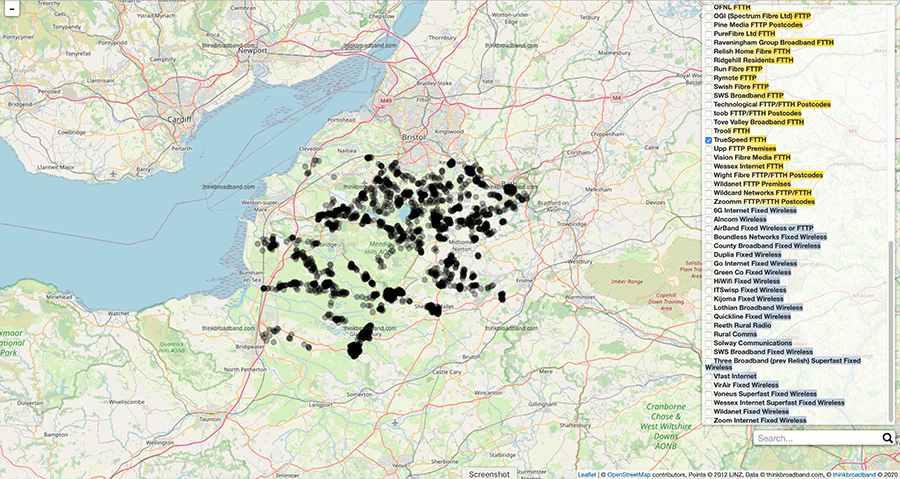
The provider has passed 75,000 properties so far, with 15,000 customers connected to their full fibre network. In 2022 alone, they added 25,000 properties to their network in North Somerset and the South West.
This included a combined investment of £39 million across Portishead and Clevedon, Peasedown St John, Midsomer Norton, Keynsham, Saltford, Radstock, Uphill, Banwell, Sandford, Thornbury, Almondsbury, Bradley Stoke, Patchway, Stoke Gifford and Chipping Sodbury, and Bathwick, Widcombe and Combe Down.
Truespeed have ambitious growth plans too, aiming to pass 500,000 premises in South West England by 2025.
Rural broadband prices with Truespeed range from £25 a month on current special offer:
| Package | Broadband | Monthly price | Upfront price | Contract term | |
|---|---|---|---|---|---|
| Truespeed | Truespeed 150 | 150Mb average | £25 | Free | 12 months |
| Truespeed | Truespeed 900 | 900Mb average | £49 | Free | 12 months |
Installation is free as long as customers give their consent for Truespeed to apply for the Gigabit Voucher Scheme on their behalf, run by the UK Government.
Other rural broadband providers
We've touched on a few of the biggest rural broadband providers in the UK, but there are many more, often working in small local areas around the country.
This includes:
- Giganet
- Wildanet: Dobwalls and Liskeard in Cornwall
- OGI: in Wales and Bristol, specifically Milford Haven, Haverfordwest, Abergavenny, Monmouth, Llanwit Major, St Athan, Dinas Powys, Cardiff, and Bristol
Grants for rural broadband
Due to the Government's rural broadband grant scheme, Project Gigabit, or the Gigabit Broadband Voucher Scheme, there are many providers open to potential build-outs into rural communities.
This includes larger providers such as Openreach, Virgin Media, and KCOM in Hull, as well as smaller independent full fibre networks such as CityFibre, YouFibre, Cerberus Networks, WightFibre, and many others with a fully searchable list on the Government's website.
Initially launched in 2018, after being rumoured in 2016, the Gigabit Broadband Voucher Scheme offers funding to community groups and private households to help cover the cost of installing gigabit-capable broadband.
It's particularly aimed at underserved, rural, areas where commercial investment is not prioritised due to either reduced demand from smaller populations, or higher installation costs as areas are remote are harder to reach.
The scheme works on a roughly six step process:
- Find a registered supplier working in or near your location and sign up for a gigabit broadband connection
- The supplier requests a voucher from the Government to help cover network build and installation costs
- The supplier builds-out their network and installs the new broadband connection
- Once a community or household is connected, the supplier will tell the Scheme the work is completed
- The Scheme will then check with the community, or household, to confirm the broadband service is working correctly
- Other checks may be performed, but the installation is then signed off
The UK Government has ring-fenced up to £210 million of funding for the Gigabit Broadband Voucher Scheme, to specifically help people living in rural areas to get decent broadband speeds.
Vouchers are worth up to £4,500 for homes, businesses and community groups to help cover the cost of installing gigabit broadband to the premises.
The scheme is run to help ensure the Government's target of 99% gigabit-capable broadband coverage is achieved by the end of 2030, and that rural areas are not left behind.
Rural broadband alternatives
For very remote areas where rural broadband, even via Project Gigabit, is not available, people may want to consider certain alternatives, including satellite broadband and mobile broadband or 4G and 5G.
Mobile broadband
Mobile broadband is considered a viable alternative to fixed line broadband in rural areas, and is a fundamental part of the Government's aim to ensure everyone has a decent Internet connection.
The Shared Rural Network (SRN) is an agreement between mobile networks and the Government to share mobile infrastructure in hard to reach areas to improve mobile connectivity for people.
The Government wants to achieve 95% 4G mobile coverage by the end of 2025. O2, Vodafone, Three and EE will invest £532 million in areas where there is coverage from at least one, but not all mobile operators, and then the Government will invest a further £500 million to reach underserved and rural areas that wouldn't otherwise be commercially viable for the networks.
For mobile broadband for the home, most of the networks offer home broadband style routers, or mobile hotspots to share a 4G connection:
| Device | Data | Monthly price | Upfront price | Contract term | |
|---|---|---|---|---|---|

|
4G Hub | Unlimited | Free for 3 mths, then £20 | Free | 24 months |
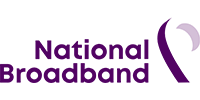
|
4G Internet Home Router | Unlimited | £39.99 | £99 | 12 months |

|
4G Mobile Hotspot | Unlimited | £30 | Free | 24 months |
Overall, while mobile broadband can be more expensive, especially for unlimited usage plans, it's a viable option for people living in more rural areas where 4G coverage has reached them.
Satellite broadband
Satellite broadband can provide an Internet connection almost anywhere, so it's a viable option for even the most remote properties in the UK, whether they're located in England, Scotland, Wales or Northern Ireland.
Satellite broadband works by beaming the Internet signal directly from a satellite in the sky to a satellite dish installed outside a home, in the same way as Sky TV works. This means as long as there is a direct line of sight to the particular satellite orbiting the Earth, nearly every home can get a connection, regardless of how remote or rural it is.
Due to the increased cost of equipment however, it's often more expensive than fixed line or full fibre broadband, especially for the upfront fees to get going.
For example, the cheapest upfront cost for satellite broadband in the UK is £180 with Relialink if customers install the equipment themselves or £324 if they choose a professional installation. Other providers charge upwards of £400.
Here's the latest pricing for satellite broadband providers in the UK:
| Monthly cost | Setup cost | Download speed | Data usage | |
|---|---|---|---|---|
| Freedomsat | £25 | £400 | 25Mb | 10GB |
| Relialink | £25 | £324 | 25Mb | 10GB |
| Starlink | £75 | £449 | 50-200Mb | Unlimited |
We've included the entry-level packages in the above table, but there are faster options with greater download allowances also available.
It's worth bearing in mind these packages often have minimum terms of 12 months or more, and they each have their own satellites, which means the connection speed and quality could vary.
While satellite broadband has always been somewhat slow, and certainly often slower than fixed line broadband with restrictive data usage limits, the technology is currently evolving.
Starlink for example use LEO-Satellite (or Low Earth Orbit), which places the satellite in orbit around the Earth much closer to the Earth's surface, at just 550 km away. This means the distance data needs to be sent back and forth is greatly reduced, meaning the Internet connection can be much faster and data doesn't need to be as restricted.
The satellites used by Relialink and Freedomsat however, the KA-SAT and Eutelsat, are both GEO-Satellites which orbit Earth at around 35,786 km from the surface.
Overall then, while satellite may have been an unwelcome option for rural homes, it's still expensive but it's becoming a more realistic alternative to home broadband.
Summary: Best options for rural broadband
The best rural broadband provider will vary based on location as there are numerous independent full fibre networks specifically aiming to connect rural communities and households.
However, unless a full fibre network is already active in your area, its likely households will need community support to raise the funds required to build the networks, along with using the Government's rural broadband grant scheme.
Rural homes without the option of a nearby fibre broadband provider can also consider fixed wireless, satellite and 4G mobile broadband as viable alternatives, and while costs are higher, speeds are catching up, making these alternatives a more realistic option.
The Shared Rural Network scheme should also help to improve mobile coverage in remote areas, with a target of 95% 4G coverage by the end of 2025. And satellite broadband is also seeing advancements with the invention of Low Orbit satellites like Starlink becoming available.
Overall, while broadband for those living in rural areas has often been frustrating and slow, if available at all, there are increasingly more options available to help people get online.
Read more about what broadband speed you need and the different broadband networks operating in the UK.









Comments